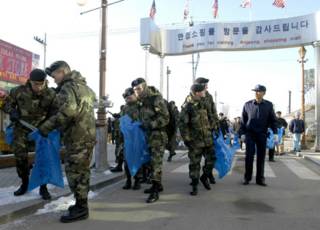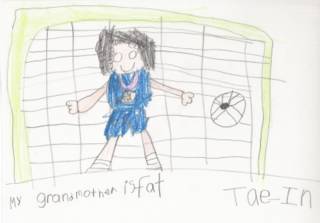Alternate Images

Bloodthirsty Murderers or Altruistic Do-gooders?
On June 3, I posted “One Woman’s Deep Ambivalence.” In part, I described a conversation with a fellow Korean student about the U.S. Military presence in South Korea. During our talk, she said something to the effect of “I do think the United States sends the worst soldiers to Korea — the most stupid and violent ones.” This got me thinking.
U.S. Soldiers in Korea get a bum wrap. Their public image in South Korea is overwhelmingly negative. The media focuses on GI crime and public drunkenness. The few alternative portrayals in Korea are provided by U.S. Military press releases that are sometimes rerun in Korean newspapers. These are equally shallow and generally derided by Koreans as obvious propaganda. Neither is a holistic look.
I am not an apologist for the American Military. On a general level, I have a vague spiritual/moral problem, which I cannot fully express, with a global nation-state system predicated on military power and a general suspicion of the people who perpetuate it. Specifically, I’ve found the politics of military personally in Korea, on the whole, deeply flawed historically and factually.
I believe GIs in Korea enjoy extraordinary extralegal and legal protection as well as special material privileges denied to the general population. And, to a large extent this is the source of the Korean public’s resentment. I also think there is some truth in the image of drunken GIs rampaging through the streets of Seoul. I’ve seen it myself on several occasions and find it distasteful. Likely, I would find it even more offensive if I had a native/nationalist tie to South Korea.
However, I think it is important to present an alternative view of U.S. soldiers as a counterbalance to the overwhelming negative imagery. My hope, however unlikely, is that younger Koreans would read this account and develop a more rounded view of military personnel. Not because I feel a nationalistic/patriotic connection with American GIs, but because I feel a human bond and don’t like them being reduced to inhuman characters.
To that end, I submit three pieces: Iraq War Takes an Uneven Toll at Home, Recruiting in a Time of War (Part I), Recruiting in a Time of War (Part II). My hope is that readers would take the time to listen to these programs in full. But, if you do not have the time or interest, here is a brief summary:
Iraq War Takes an Uneven Toll at Home:
This piece discusses a report by sociologist Robert Cushing for the Austin American-Statesman, which shows that “soldiers and Marines from rural areas are dying at twice the rate of troops from cities and suburbs.” In the report, Robert Cushing outlines the apparent causes for this “statistical anomaly”: lack of rural job opportunities, high degree of patriotism, and desire for adventure and a new life. The piece ends with a discussion with Diane and Gerald Petty, the parents of Pfc. Jerrick Petty, who was killed in Mosul, Iraq. In the interview Gerald Petty says, “If we’ve got higher numbers [of deaths in rural areas], that just means that we have more people here that are more concerned about everyone else. Whether we like it or not, we support him and we are proud of him. That they’re carrying the country basically. That they are selfless in their endeavor to keep the American Way.”
Recruiting in a Time of War (Parts I and II):
This two-part programs follows Sgt. 1st Class Jimmy Bowie, an Army recruiter in Huntsville, Texas. In talking to him, the piece explores his tactics in recruiting solders and motivations behind his recruits’ decisions to join. The motivations are very much the same as those cited by sociologist Robert Cushing: lack of rural job opportunities, high degree of patriotism, and desire for adventure and a new life. The most compelling part of program is the discussion between a mother and her son over his decision to join the Army. “She’s got to understand that there is nothing here for me,” he says. “I know. I just don’t want him to die,” she responds, audibly fighting back tears.
The current and future soldiers’ humanity comes across strikingly in all three programs. The image is of human cogs caught in a machine far greater than them. It is also important to note that none of this was part of the hyperbole surrounding Memorial Day in the States. All three pieces were broadcast well before May 31.






0 Comments:
Post a Comment
<< Home